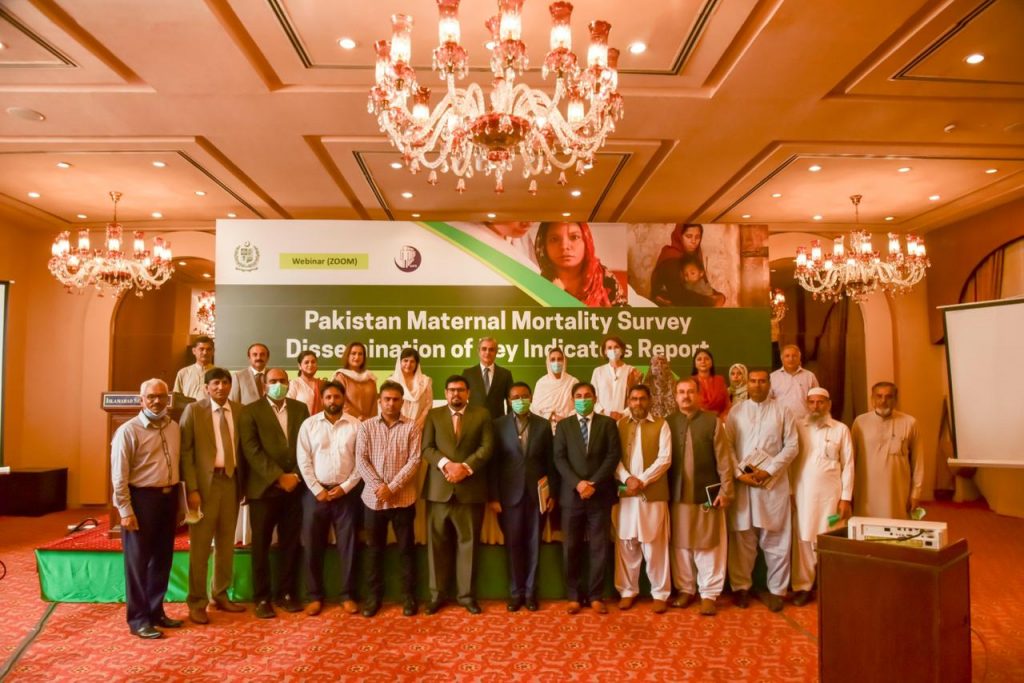ISLAMABAD ( WEB DESK )
Maternal mortality ratio (MMR) in Pakistan has decreased from 276 deaths
per 100,000 live births as per Pakistan Demographic and Health Survey of 2006-7 to 186, according to
the latest Pakistan Maternal Mortality Survey (PMMS). The key findings of the first exclusive nationwide survey were released today at a Webinar in Islamabad organized by the National Institute of
Population Studies (NIPS).
The findings highlighted that improvements in health services in the last decade and enhanced
awareness and utilization of antenatal and postnatal care by women are likely to have contributed to
the overall decrease in the MMR.
The maternal mortality ratio (MMR) is lowest in Punjab (157 per 100,000 live births), followed by
Khyber Pakhtunkhwa (165 per 100,000 live births), Sindh (224 per 100,000 live births), and Balochistan
(298 per 100,000 live births). The MMR is 104 in Azad Jammu and Kashmir, and 157 in Gilgit-Baltistan.
The maternal mortality ratio (MMR) is higher in rural areas (199 deaths) than in urban areas (158
deaths). The MMR is 26% higher in rural areas than in urban areas.
Speaking on the occasion, Dr. Nausheen Hamid, Parliamentary Secretary, National Health Services,
Regulations and Coordination appreciated the efforts of National Institute of Population Studies for
research work and survey on maternal health. She informed that accessibility to maternal health
facilities was an important priority of the government. She emphasized the need of further improve
the quality of maternal health issues.
Ms. Lina Mousa, UNFPA Representative said in her remarks; “The results are encouraging and provide
reliable data for policy development and programme planning for maternal and child health. Though
there is decline in the maternal mortality ratio compared to 276 per 100,000 in 2006/07 Pakistan has
to do more for women who are least likely to receive adequate health care, residing in remote areas
with lower numbers of skilled birth attendants or health facilities, and strive to achieve universal

COVID19 pandemic have posed new and considerable challenges for health and population
departments to continue the provision essential maternal and newborn healthcare services including
family planning. According to the COVID19 Pakistan Socio-Economic Impact Assessment, 20% decline
in maternal health care could result almost 0.8m additional births without access to health facilities
leading to over 2,000 additional maternal deaths and almost 59,000 additional still births.”
DFID Pakistan Country Director Ms. Annabel Gerry said; “I’m proud to support this important study to
assess the levels of maternal mortality in Pakistan. An improved access to family planning services is
at the heart of UK’s development agenda in Pakistan. I believe that with accurate data and through
our continued technical assistance to Punjab and KP, we will achieve the target of reducing maternal
mortality rate in the country.”
The United States government congratulates Pakistan on its commendable accomplishment in
reducing maternal deaths by one-third,” said Acting USAID Mission Director Mr. Clay Epperson. “It
reflects the impact of the partnership between the Government of Pakistan, USAID and other
development partners, as well as the civil society and private sector to ensure that pregnant women
deliver in the presence of a skilled health professional.”
The Webinar was also attended by representatives of United Nations Population Fund (UNFPA),
Department for International Development (DFID), USAID, ICF International, Bill and Melina Gates
Foundation besides national and international health and population experts.

